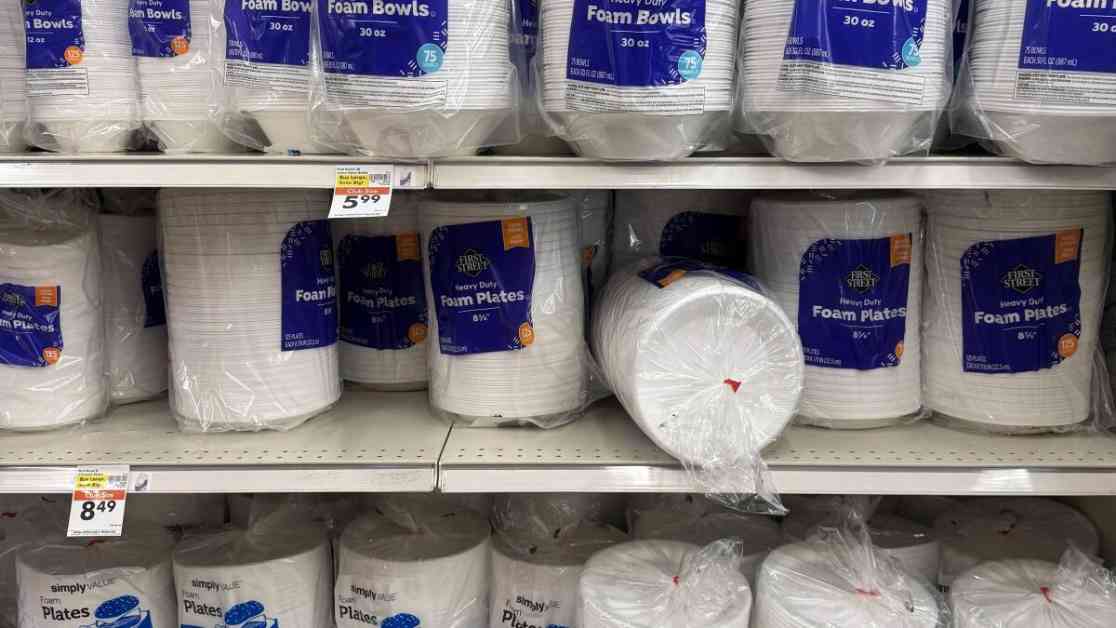Polystyrene, the soft, white, foamy material commonly used for takeout food service items, is still being sold in California despite a ban that went into effect on January 1, 2025. This ban was part of the single-use plastic law, Senate Bill 54, signed into law by Governor Gavin Newsom in 2022. Now, with the ban on polystyrene still in effect despite the rest of the bill being in limbo, confusion and controversy surround the enforcement of this law.
Smart and Final, a popular retail store in Redwood City, was seen brimming with foam plates, bowls, and cups for sale even after the ban came into effect. Interestingly, these items were also readily available for purchase on Amazon.com, indicating a significant oversight in enforcing the ban on polystyrene products. Despite the ban, businesses like KaTom, a restaurant supply shop based in Kodak, Tenn., have continued to offer these products without repercussions.
Nick Lapis, the director of advocacy for Californians Against Waste, one of the key organizations involved in crafting SB 54, emphasized that the law was designed to ensure the polystyrene ban would be implemented regardless of the status of the rest of the bill. However, the lack of clear direction on enforcement has left businesses and consumers uncertain about the legality of buying and selling these products.
The ban on polystyrene was meant to address the larger issue of single-use plastics and their impact on the environment. SB 54 required plastic and packaging companies to reduce single-use plastic packaging by 25% and ensure that 65% of the material is recyclable by 2032. By shifting the responsibility of end-life management of packaging from consumers and local governments to producers, the law aimed to reduce plastic waste and promote recycling and composting efforts.
Despite the environmental benefits of reducing single-use plastics, representatives from the plastic, packaging, and chemical recycling industry raised concerns about the cost and feasibility of implementing the regulations outlined in SB 54. This pressure led to Governor Newsom halting the implementation of the bill’s rules and regulations, leaving the ban on polystyrene as the only provision currently in effect.
The recycling rates for expanded polystyrene products have remained low, with national rates hovering around 1%. This failure to meet the recycling targets set by the law has resulted in a de facto ban on polystyrene in California. However, the lack of clear communication from CalRecycle, the state’s waste agency, and Newsom’s office has left many stakeholders in the dark about the enforcement of the ban.
At a recent state Senate budget hearing, lawmakers questioned CalRecycle officials about their inaction on enforcing the polystyrene ban. Sen. Ben Allen expressed concerns about the lack of progress in prohibiting the sale of expanded polystyrene products that did not meet the requirements under SB 54. Yana Garcia, the secretary of CalEPA, acknowledged the need for clearer messaging and enforcement around the polystyrene ban.
Jan Dell, the founder of the environmental group Last Beach Cleanup, criticized CalRecycle’s inability to effectively enforce the ban on expanded polystyrene products. She suggested that the entire law should be repealed to save taxpayer money and focus on stricter bans on the worst plastic pollution items. Turner from CalRecycle mentioned that the agency could provide compliance assistance, initiate investigations, and issue notices of violation to businesses violating the ban.
The issue of polystyrene ban enforcement is just one part of the larger problem of single-use plastics and plastic waste in California. With over 2.9 million tons of single-use plastic sold in the state in 2023, the need for effective laws and enforcement mechanisms to tackle this growing environmental and health problem is more critical than ever. Newsom’s decision to halt the enforcement of the plastic waste law highlights the ongoing challenges in balancing environmental protection with economic concerns.
In conclusion, the continued sale of polystyrene products in California despite the ban underscores the complexities of enforcing environmental regulations in a state with a large and diverse economy. As stakeholders grapple with the implications of the ban and the broader issues of plastic waste, the need for clear communication, effective enforcement, and sustainable solutions remains paramount to protect the environment and public health.














